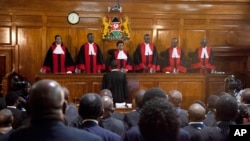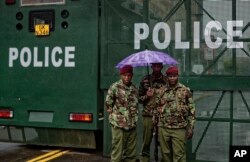Kenya’s Supreme Court on Tuesday rejected the participation of the main opposition coalition in petitions challenging President Uhuru Kenyatta’s victory in last month’s presidential election, in what may be the last chance for legal scrutiny of the vote.
The ruling, on the first day of the court’s review of the petitions, is a setback for opposition leader Raila Odinga’s NASA coalition, which hopes to overturn President Uhuru Kenyatta’s victory in the Oct. 26 poll.
The court has until Nov. 20 to rule on the petitions, the latest chapter in a protracted political crisis that has stirred fears for the stability of the east African nation, a regional hub for trade, diplomacy and security.
If the election result is upheld, Kenyatta will be sworn in on Nov. 28.
Delivering rulings on preliminary issues, the court upheld an objection by Kenyatta’s lawyers to the participation of the NASA coalition.
“NASA cannot be sustained as a respondent in this matter,” Justice Jackton Ojwang said while reading a unanimous decision, promising to give the court’s reasons at a later date.
The two petitions by a former lawmaker and two human rights activists argue the poll’s outcome is void because the election board did not hold fresh nominations after an earlier, Aug. 8 poll was invalidated, among other reasons.
Leaked internal memos
The court also struck out leaked internal memos of the election board that the petitioners sought to rely on in their case. The court will deliver a ruling on the petitioners' application for scrutiny of the election returns on Wednesday.
Security was tight outside the courtroom, which has been center stage for Kenyan politics since it nullified the results of August's presidential election. That decision led to the re-run election on Oct. 26.
The court has not convened since the day before last month’s election, when it had been due to deliberate on a last-minute request to delay the vote. But that hearing was cancelled because not enough judges showed up to make a quorum.
The judges had demanded more security after the bodyguard of the deputy chief justice was shot the day before the hearing and said they would refuse to attend hearings without it, a judicial source said. The government turned them down, the source said.
The chief justice later denied the Reuters report on the security issue and said the police had “enhanced” the judges’ security.
All six judges expected to be present showed up for Tuesday’s meeting. The seven-member bench is still missing one of its judges, who fell ill during the hearings related to the August election and has since been receiving treatment.
Kenyatta came to power in 2013 and won a second and final term in August, defeating opposition leader Odinga by 1.4 million votes.
Odinga did not contest the repeat vote on Oct. 26, saying it would be unfair because the election commission had failed to implement reforms. Kenyatta won with 98 percent of the vote, though opposition supporters staged a boycott and prevented polls from opening in the west of the country.
The week before the vote, the head of the commission said he could not guarantee the vote would be free and fair, citing interference from politicians and threats of violence against his colleagues.
Kenya’s prolonged election season has disrupted its economy.
Human rights groups say at least 66 people have died in bloodshed surrounding the two elections.
The Supreme Court was created by a 2010 constitution that followed a violent political crisis three years earlier. Around 1,200 people were killed in ethnic clashes after a disputed election in 2007.






